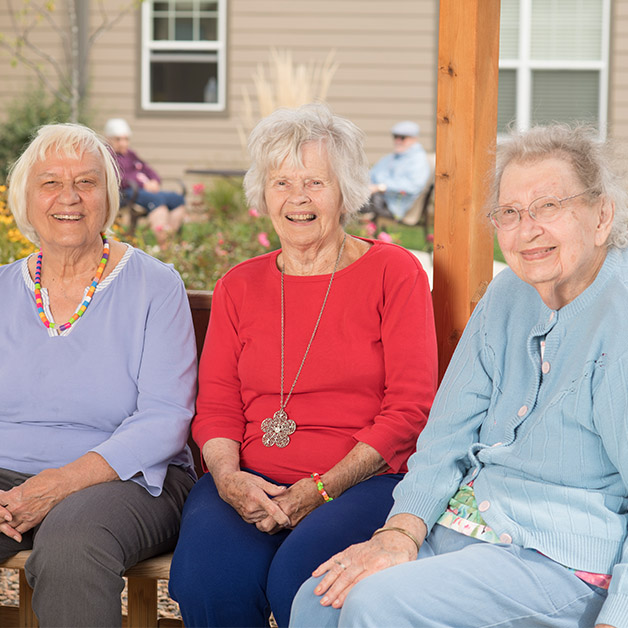Premier Charlotte Memory Care: Enhancing Lifestyle for Elders
Premier Charlotte Memory Care: Enhancing Lifestyle for Elders
Blog Article
Creating a Safe and Encouraging Atmosphere: In-Home Memory Care Basics
Establishing a safe and nurturing setting for individuals requiring at home memory treatment is paramount to their health and lifestyle. From ensuring security within the home to employing efficient interaction strategies and carrying out memory-friendly layout aspects, there are vital components that add to a holistic care technique. By concentrating on developing a helpful community that accommodates the unique needs of those with memory disabilities, caretakers can considerably improve the daily experiences of their loved ones.

Safe Living Setting
Producing a hazard-free and safe living setting is paramount when providing in-home memory treatment for people with cognitive problems. Making certain the safety and security of the individual with memory loss is crucial to avoid mishaps and promote a sense of well-being.
Furthermore, it is vital to install safety features such as grab bars in bathrooms and handrails along stairs to offer support and avoid accidents. Additionally, using technology such as movement sensing units and alarm systems can signal caretakers if the private wanders or is in distress. Producing a risk-free living atmosphere also involves applying approaches to stop roaming, such as using door alarm systems or locks to restrict access to unsafe areas. By prioritizing safety actions and eliminating potential threats, caregivers can provide a helpful and safe environment for individuals with cognitive impairments obtaining in-home memory care.
Reliable Interaction Methods
Executing tailored communication approaches is necessary in promoting purposeful interactions with people with cognitive problems in the context of in-home memory care. Reliable communication plays a critical role in producing an encouraging environment that enhances the health and lifestyle for individuals with memory problems. When connecting with someone experiencing cognitive decline, it is essential to use easy and clear language, keep a calm and favorable tone, and provide visual cues to help understanding.
One trick strategy is to practice energetic listening, revealing compassion, patience, and respect during conversations. Non-verbal hints such as faces and body movement can likewise aid communicate understanding and assistance. In addition, making use of memory treatment by discussing previous experiences or using music and art can use long-lasting memories, stimulating connections and promoting engagement.
Moreover, incorporating normal regimens and regular interaction patterns can provide a feeling of knowledge and security for people with memory problems. By carrying out these interaction approaches, caretakers can develop significant connections and advertise a sense of comfort and rely on the in-home memory treatment setting.
Memory-Friendly Design
Given the significance of developing an encouraging atmosphere for people with memory concerns with effective interaction methods, the consolidation of memory-friendly layout elements in the space ends up being necessary in enhancing their daily experiences and general wellness. Memory-friendly design concentrates on enhancing safety and security, convenience, and freedom for people with cognitive disabilities. Straightforward adjustments can make a significant distinction, such as making use of contrasting shades to improve presence and decrease complication, incorporating clear signs to aid navigating, and reducing mess to avoid sensory overload.
Including acquainted components from the person's past, such as personal images or favored things, can evoke positive memories and produce a sense of experience. By integrating these memory-friendly layout elements, caregivers can provide a encouraging and secure living room that enables people with memory concerns to keep their freedom and high quality of life. Charlotte Memory Care.
Daily Regimen Planning
When developing a day-to-day routine for people with memory problems, mindful planning is important to support their cognitive feature and total wellness. Developing a structured schedule can aid decrease confusion, anxiety, and disorientation usually experienced by those with index memory problems.
Versatility is crucial, as some days might require changes based on the person's state of mind and power degrees. Consistently assessing and adjusting the day-to-day timetable will certainly aid guarantee its effectiveness in advertising a favorable and soothing environment for individuals with memory obstacles.
Assistance System Execution
Developing a robust network of helpful individuals plays a pivotal role in enhancing the top quality of treatment and wellness for individuals requiring memory assistance. Family members, good friends, health care professionals, and community sources can all add to producing a strong assistance system. Interaction amongst these people is necessary to Check This Out make certain that the requirements of the individual with memory obstacles are satisfied efficiently.
Household members are often the main caregivers and form the foundation of the support group. They provide everyday care, psychological assistance, and get more friendship. When required to avoid exhaustion and ensure the finest feasible treatment for their liked one., it is crucial for family participants to look for support and break.
Along with family assistance, entailing healthcare experts such as nurses, medical professionals, and specialists can provide specific treatment and advice. These specialists can provide important insights, clinical suggestions, and support in handling the individual's condition.

Verdict
Finally, creating a safe and helpful setting for people with memory treatment requirements is necessary for their health. By developing a secure living setting, making use of efficient interaction methods, integrating memory-friendly design aspects, planning daily regimens, and applying a solid support group, caregivers can aid boost the top quality of life for those with amnesia. These crucial elements interact to develop a nurturing and encouraging atmosphere that promotes independence and boosts general quality of life.
Creating a secure and hazard-free living setting is vital when offering in-home memory treatment for individuals with cognitive problems. By focusing on security measures and getting rid of prospective dangers, caregivers can give a encouraging and protected environment for people with cognitive impairments getting in-home memory treatment.
Establishing a durable network of helpful people plays a critical duty in improving the top quality of treatment and well-being for individuals calling for memory support - Charlotte Memory Care. Interaction among these people is important to ensure that the requirements of the private with memory obstacles are met properly

Report this page